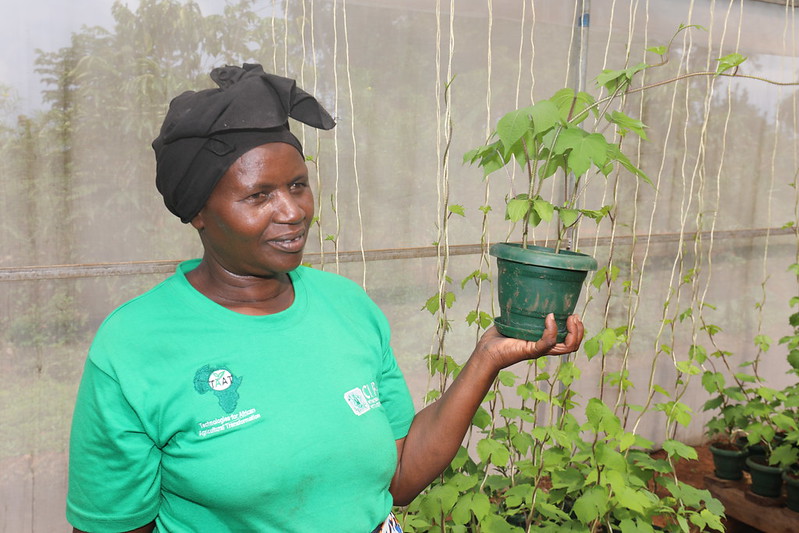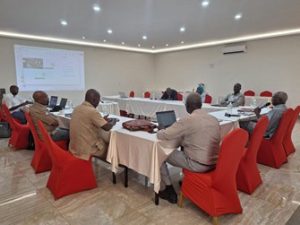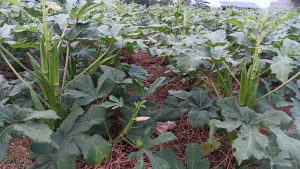Edith Rehema Namusubo: How A TAAT OFSP champion is Facilitating access to Quality Planting Materials in Uganda

In the heart of Eastern Uganda, Edith Rehema Namusubo, a 50-year-old agri-entrepreneur, has become a beacon of innovation and resilience in the sweetpotato value chain.
Since 2012, when she first caught the attention of the International Potato Center (CIP) as a potential sweetpotato seed producer, Edith has embarked on a remarkable journey that has transformed her community and beyond.
Her venture into sweetpotato rapid vine multiplication is no small feat. It demands dedication and hard work, especially during the dry season when irrigation becomes essential. With limited resources, Edith often relies on labour-intensive watering cans to nourish her crops while safeguarding them from livestock and monkeys threatening her vines and roots.
Thanks to capacity development initiatives from the African Development Bank, through its Technologies for African Agricultural Transformation (TAAT) and CIP, demand for her seeds has surged.
Edith was encouraged to recruit fellow farmers to meet this growing need, whom she diligently monitors to ensure they produce clean seed according to government certification guidelines. These farmers are classified as Tertiary multipliers by CIP.
Among her group of 30 members—25 women- Edith has expanded their activities along the value chain.
The group focuses on root production for institutional markets and innovates with OFSP (Orange-Fleshed Sweetpotato) puree to create popular items like chapatis and mandazis.
They have even ventured into producing OFSP flour, which is sold as either pure OFSP or a composite product. One of their most exciting innovations is “OFSP coffee,” made from dried, roasted, and crushed sweetpotato roots. This aromatic beverage is quickly becoming a local favourite.
Edith’s commitment to sustainability ensures that no part of the sweetpotato goes to waste.
Following training from TAAT, her group produces silage using sweetpotato vines collected post-harvest and non-marketable roots. Mixing these with maize bran creates nutritious feed supplements for their livestock, leading to improved milk yields and weight gain.
Through her extensive work in the OFSP value chain, Edith employs 15 youth—some permanently and others temporarily. She envisions even greater employment opportunities once her products receive certification from the Uganda Bureau of Standards.
As NGOs increase awareness of OFSP’s nutritional benefits, Edith’s market reach expands. Between April and June 2024 alone, she sold over 100 metric tons of vines to various NGOs and individual farmers.
Her exemplary work has earned her invitations from TAAT’s OFSP compact to showcase her technologies at significant events, including the recent Annual Source of the Nile Show in Jinja.
Edith is actively engaged in a groundbreaking initiative with Makerere University to produce Early Generation Seed through the use of Setosa. This innovative and cost-effective approach allows seed producers to identify and select disease-free vines from established crops, which can then be propagated into certified seed varieties favored by local farmers.
Edith Rehema Namusubo’s mission extends beyond agriculture; it embodies empowerment, sustainability, and the transformation of communities through agricultural innovation.
Recent Stories
Related Stories
- From Waste to Wealth: How TAAT is Empowering Young Farmers with Sweetpotato Silage for Income Generation
- Uganda: TAAT showcases improved and resilient soybean varieties
- How TAAT is Unlocking Uganda’s Soybean Potential through Youth-driven Value Addition
- How TAAT Orange-fleshed sweet potatoes sparked a wellness movement
- TAAT-vetted Vegetable Varieties Double Ghana’s Tomato Yields to 20 Tons Per Hectare






